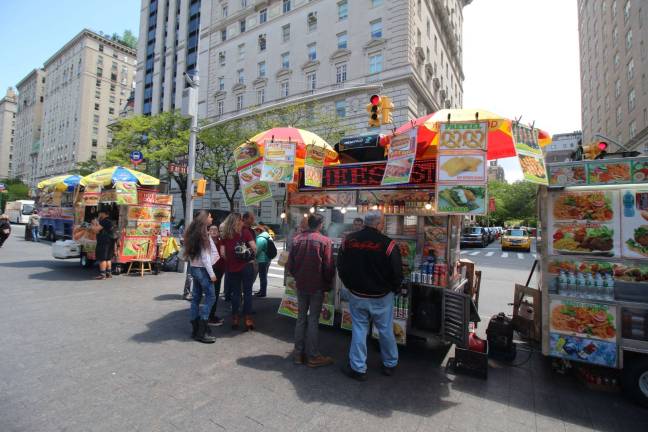Shopkeepers oppose vendor permit increase


A proposal to double the number of street vendor permits citywide has increased tensions between business owners and street vendors on the Upper East Side.
It’s no secret that brick and mortars have been butting heads with street vendors in the city for years. Some small business owners on the Upper East Side say the proliferation of vendors has translated into a decrease in sales. And several owners have complained to police, saying vendors operate illegally in front of their stores.
“I don’t mind having a little healthy competition,” said Xavier Herrera, co-owner of Latin Bites on East 70th Street, a few doors west of York Avenue, where several food trucks and other vendors do a healthy lunch business on weekdays. “The only thing I’m against is people breaking the law.”
The proposed legislation being considered by the City Council, the Street Vending Modernization Act, would double the number of street vendor permits by 2023. This has further heightened concerns on the Upper East Side. Michele Birnbaum, co-chair of Community Board 8’s vendor task force committee, said she’d received numerous complaints long before the new legislation was proposed.
Birnbaum suggested that the increase in food vendors would further affect quality of life on the Upper East Side.
“The brick and mortars have rent and health regulations and employees that street vending does not have. That means it’s not an even playing field and it’s not in a community’s best interest to encourage street activity like that,” she said before a task force committee meeting on Oct. 20 at which the issue was discussed. “It creates crowding, odor and sanitation issues.”
Dan Rossi, a hot dog vendor for 37 years, said that adding more vendor permits would complicate the issue.
“We have nobody on our side. The government thinks they’re helping these poor immigrants. These poor immigrants will get the permits, they’re just gonna lease them out,” he said after the meeting.
The City Council’s consumer affairs committee was to discuss the legislation on Oct. 26.
According to Rossi, about 90 percent of vendor permits are being leased out on the black market for more than they’re worth. He said the only way to get rid of the black market is to allow for an unlimited number of permits.
“There’s a way to do this to help people who want to vend, but this isn’t it. You should just take the cap off so there’s no value to the permit,” said Rossi, who sets up his cart in front of The Met Fifth Avenue.
Business owners who attended the Oct. 20 meeting were less concerned with the number of permits available and more concerned with enforcing current laws. Herrera “donated” a copy of the rules and regulations for street vendors to a police officer at the meeting, saying, “it seemed like (police) are not familiar with it.”
Herrera and his sister, Maria, opened Latin Bites two years ago. Before that, he had been a street vendor for 18 years. He said for the past year, there have been vendors parking illegally outside of his business.
“Right in front of my business is parking for commercial vehicles only for half an hour,” he said. “(The vendor) gets here around 7 in the morning even though there’s no parking allowed until 10 a.m. and he stays all day.”
Herrera said in the past year, his business went down by 50 percent. If this continues, he fears he’ll have to close down.
“This is my life savings I put together. It took about half a million dollars to do this,” he said. “My main concern is I have 11 employees with families to take care of — right now it’s very difficult to make payroll.”